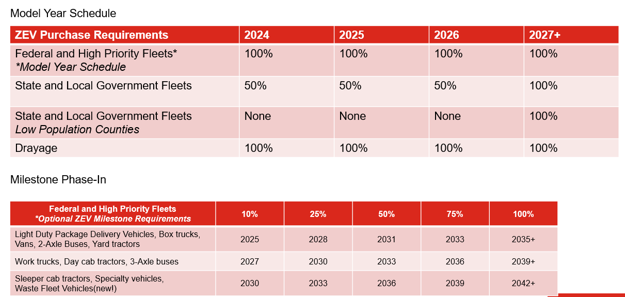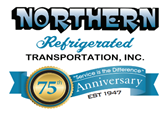As you may or may not have heard, CA has proposed mandates for newly purchased Class 8 trucks to all be zero emission vehicles (ZEV) by 2039-2042 depending on tractor type. That sounds like aways off but as you can see below, 10% of all new purchases of day cabs must be zero emission by 2027 and all sleeper cabs by 2030. This means the time for carriers to develop their strategies is now.

While most of us want clean air to breathe now and for future generations, this will have a dramatic impact on the trucking industry in CA and the prices we all pay for just about everything we buy. Why is that? Here a few key points:
- The current cost of diesel truck is $185k-$220k.
- The current cost of an electric or hydrogen fuel cell ZEV truck is $500-$650k.
- There are some government funds to help offset the cost right now, but you can see the impact of the significant cost difference.
- The current range of an electric truck is stated as 300 miles on a single charge but most companies testing are reporting more like 160 miles.
- This means longer transit times and more labor expense to get goods to market.
- The current reliability of the new ZE technologies is less than stellar with much more “downtime” than diesel trucks.
- This means there will be a need to have more of these expensive trucks in fleets since the out of service percentage will be much higher.
- The infrastructure to charge electric vehicles or fuel hydrogen currently does not exist on a meaningful scale and will be a long, expensive and expansive undertaking to establish.
- The ZEV solutions currently on the market are much heavier and require reduced load weights which means a high per pound shipping cost.
All of this is very gray at this point and is still in the “proposed stage”. However, to be a good partner, we wanted to make you aware and provide as much insight as we can. History suggests that CA will act on this “proposal”. It also suggests that the technology will improve, and costs will decrease but the cost difference will likely still be significant.
The current proposal allows diesel trucks to be in service if they are under 800k miles and less than 13-15 years old (depending on tractor type). This will result in larger fleets being more closely monitored and forced to comply and invest at a higher level while smaller fleets and owner operators will have more leeway. CA has not announced any insights into how they will measure, monitor, and enforce these requirements. We are likely to have an unbalanced market with some companies complying and having significant cost increases versus those that don’t comply or are not forced to as quickly.
Northern Refrigerated Transportation remains committed to being compliant with all State and Federal requirements and providing cost-effective, reliable service to our customers. We are actively involved in exploring the most cost-effective and reliable options in this constantly evolving landscape while keeping in mind that early iterations of new technology are overly expensive, not efficient and less reliable . We are hopeful this information is insightful as you plan for your business’ future. We will continue to keep you apprised as things develop.
Thank you for your business and loyalty as we navigate the future together!
